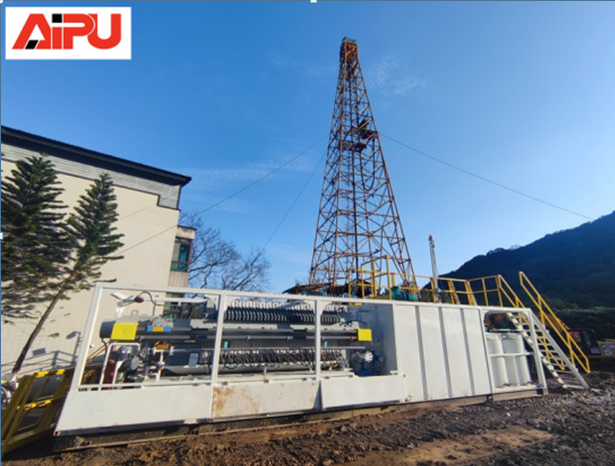Advancements and Impact on Drilling Operations
In the realm of drilling operations, high - precision solids control equipment plays a pivotal role. These tools are designed to separate and manage solid particles from the drilling fluid, ensuring the smooth and efficient progress of the drilling process. This article will explore the key aspects of high - precision solids control equipment for drilling.
Importance of High - Precision Solids Control
High - precision solids control is essential for maintaining the quality of the drilling fluid. By removing unwanted solid particles, the equipment helps to reduce wear and tear on drilling components such as pumps and bits. This not only extends the lifespan of these expensive parts but also improves the overall performance of the drilling rig. Moreover, proper solids control can enhance the stability of the wellbore, reducing the risk of wellbore collapse and other drilling - related accidents. Additionally, it helps to meet environmental regulations by minimizing the discharge of contaminated drilling fluids.
Types of High - Precision Solids Control Equipment
There are several types of high - precision solids control equipment commonly used in drilling. One of the most fundamental is the shale shaker. It uses vibrating screens to separate large solid particles from the drilling fluid. The decanter centrifuge is another crucial piece of equipment. It operates on the principle of centrifugal force to separate fine solids from the fluid, achieving a high level of separation efficiency. Hydrocyclones are also widely employed. They can separate particles based on their size and density, effectively removing medium - sized solids from the drilling fluid. Each type of equipment has its unique features and is selected according to the specific requirements of the drilling operation.
Technological Advancements in Solids Control Equipment
Recent years have witnessed significant technological advancements in high - precision solids control equipment. For example, modern shale shakers are equipped with advanced vibration systems that can adjust the amplitude and frequency according to the characteristics of the drilling fluid and the size of the solids. Decanter centrifuges now feature more precise speed control and improved bowl designs, resulting in better separation performance. In addition, the use of intelligent sensors and control systems allows for real - time monitoring and adjustment of the equipment, optimizing its operation and reducing human error.
Challenges and Future Trends
Despite the many benefits of high - precision solids control equipment, there are still some challenges. One of the main challenges is the high cost of purchasing and maintaining these advanced tools. Another challenge is the need for highly skilled operators to ensure the proper functioning of the equipment. Looking ahead, future trends in high - precision solids control equipment may include further miniaturization and integration of different types of equipment, as well as the development of more environmentally friendly and energy - efficient technologies. These trends will continue to drive the improvement of drilling efficiency and environmental protection in the drilling industry.

Importance of High - Precision Solids Control
High - precision solids control is essential for maintaining the quality of the drilling fluid. By removing unwanted solid particles, the equipment helps to reduce wear and tear on drilling components such as pumps and bits. This not only extends the lifespan of these expensive parts but also improves the overall performance of the drilling rig. Moreover, proper solids control can enhance the stability of the wellbore, reducing the risk of wellbore collapse and other drilling - related accidents. Additionally, it helps to meet environmental regulations by minimizing the discharge of contaminated drilling fluids.
Types of High - Precision Solids Control Equipment
There are several types of high - precision solids control equipment commonly used in drilling. One of the most fundamental is the shale shaker. It uses vibrating screens to separate large solid particles from the drilling fluid. The decanter centrifuge is another crucial piece of equipment. It operates on the principle of centrifugal force to separate fine solids from the fluid, achieving a high level of separation efficiency. Hydrocyclones are also widely employed. They can separate particles based on their size and density, effectively removing medium - sized solids from the drilling fluid. Each type of equipment has its unique features and is selected according to the specific requirements of the drilling operation.
Technological Advancements in Solids Control Equipment
Recent years have witnessed significant technological advancements in high - precision solids control equipment. For example, modern shale shakers are equipped with advanced vibration systems that can adjust the amplitude and frequency according to the characteristics of the drilling fluid and the size of the solids. Decanter centrifuges now feature more precise speed control and improved bowl designs, resulting in better separation performance. In addition, the use of intelligent sensors and control systems allows for real - time monitoring and adjustment of the equipment, optimizing its operation and reducing human error.
Challenges and Future Trends
Despite the many benefits of high - precision solids control equipment, there are still some challenges. One of the main challenges is the high cost of purchasing and maintaining these advanced tools. Another challenge is the need for highly skilled operators to ensure the proper functioning of the equipment. Looking ahead, future trends in high - precision solids control equipment may include further miniaturization and integration of different types of equipment, as well as the development of more environmentally friendly and energy - efficient technologies. These trends will continue to drive the improvement of drilling efficiency and environmental protection in the drilling industry.








